Showing vs. Telling in Pitches
What Does “Show, Don’t Tell” Mean?
What Does “Show, Don’t Tell” Mean?
One of the trickiest parts of crafting a pitch is knowing how much to reveal. You want to give agents and editors a sense of your story’s theme and takeaway, but you don’t want to spoil the ending, otherwise why bother reading the manuscript? How do you strike the right balance?
Your pitch is more than just a summary of your story—it’s a reflection of your narrative voice. Infusing your pitch with your story’s unique style is the key to making it stand out to agents and editors.
The Importance of Voice: Voice is the personality of your writing. It’s what makes your story unique and memorable. When crafting your pitch, try to capture the same tone and style that you use in your manuscript.
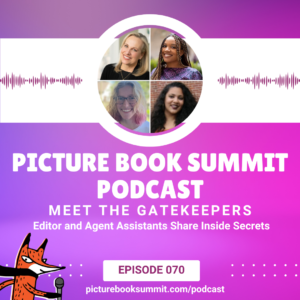 If you can’t get your manuscript past the gatekeepers, you have zero chance of getting published. So who are the gatekeepers? They are often editor and agent assistants. These assistants often take the first pass at the agent’s or editor’s inbox to eliminate manuscripts that don’t follow guidelines or don’t meet their boss’ tastes.
If you can’t get your manuscript past the gatekeepers, you have zero chance of getting published. So who are the gatekeepers? They are often editor and agent assistants. These assistants often take the first pass at the agent’s or editor’s inbox to eliminate manuscripts that don’t follow guidelines or don’t meet their boss’ tastes.
In this episode, Emma Walton Hamilton asks editor and agent assistants AZ Hackett, Claire Tattersfield, and Gaby Caballero all the burning questions from writers and illustrators like you.
Listen here:
In the Picture Book Pitch Formula, we gave you a template to use as a starting point for writing your pitches. As a reminder, this is the template:
You’ll notice that this template incorporates all the key components of a great pitch.
The template is powerful because it removes the guesswork around how to fit so much information into just 1-3 sentences.
Let’s show you what this looks like in action by using a classic picture book we’re all familiar with – WHERE THE WILD THINGS ARE.
Here’s how all the key components are included in this pitch:
Now try the template with your own picture book pitches!
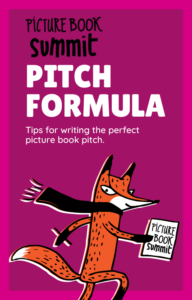
Want more help with picture book pitches? Grab our FREE Picture Book Summit Pitch Formula HERE!
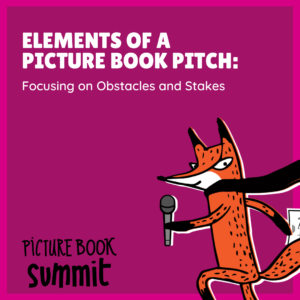 A great picture book pitch isn’t just about conveying what your hero wants—it’s about what’s standing in their way. It’s about conveying the dramatic tension in your story, and what’s at stake for your hero.
A great picture book pitch isn’t just about conveying what your hero wants—it’s about what’s standing in their way. It’s about conveying the dramatic tension in your story, and what’s at stake for your hero.
Understanding the role of obstacles and stakes is key to creating a pitch that resonates with agents, editors, and ultimately, readers.
Every pitch starts with a hero and their goal. But achieving a goal without obstacles is too easy… why should the reader care? It’s the challenges and conflicts that make a story engaging.
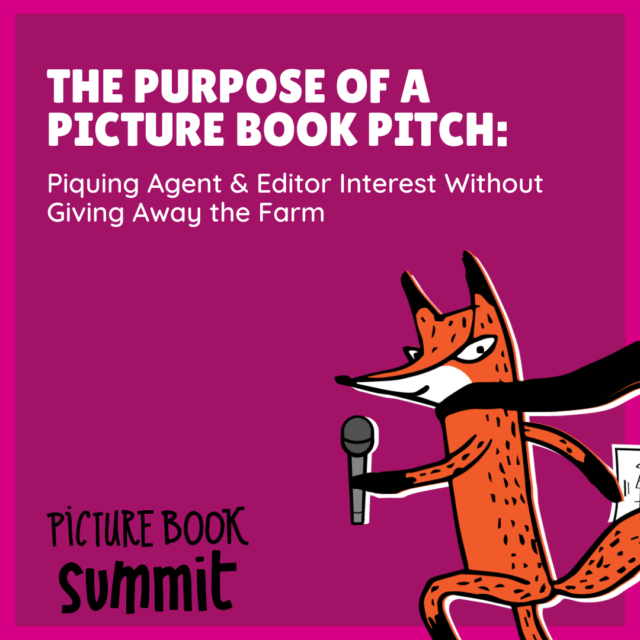 Crafting a compelling pitch is an essential skill for any picture book author. It is the single most important part of your submissions package to agents and editors for publication consideration. A well-written pitch will spark an agent or editor’s interest, making them eager to read your manuscript.
Crafting a compelling pitch is an essential skill for any picture book author. It is the single most important part of your submissions package to agents and editors for publication consideration. A well-written pitch will spark an agent or editor’s interest, making them eager to read your manuscript.
But what exactly is a pitch, and how do you create one that stands out?
A pitch, also known as an elevator pitch, hook, or logline, is a brief synopsis of your picture book. It’s a 1-3 sentence summary that captures the essence of your story without giving away too much. Think of it as your story’s “trailer”—it should be intriguing and leave the audience wanting more.
Since last week’s Mini Summit, we’ve received lots of questions about the Summit + Submissions Ticket for Picture Book Summit 2024 – Perfect 10: Going for Picture Book Gold! So, we’re here today to answer the most frequently asked questions before Early Bird pricing expires this Friday, September 6, 2024.
First, let’s introduce to this year’s Featured Agents and Editors and tell you a little bit about their panels at Picture Book Summit.
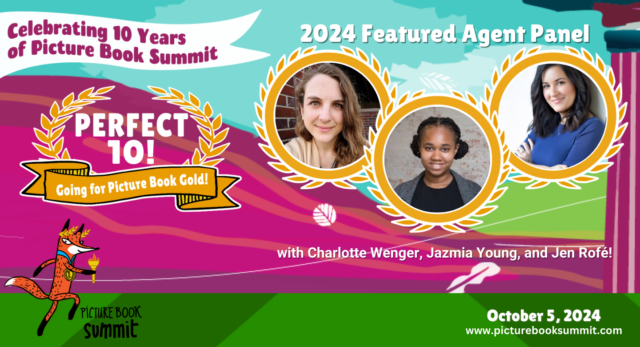 AGENT PANEL – Top 10 Questions for Agents
AGENT PANEL – Top 10 Questions for Agents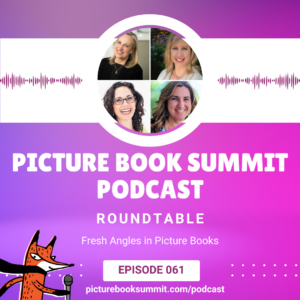 Today we bring you a super fun episode of the PBSummit Roundtable episode as we talk about fresh takes in picture books. Our Roundtable discussions are where we discuss news and topics affecting picture book writers and illustrators today.
Today we bring you a super fun episode of the PBSummit Roundtable episode as we talk about fresh takes in picture books. Our Roundtable discussions are where we discuss news and topics affecting picture book writers and illustrators today.
Agents and publishers are always saying they’re looking for stories that are “fresh and unique”, but what does that mean? Our Roundtable discussion centers around fresh angles in picture books.
Listen in as we take a look at some truly unique stories which perfectly exemplify what fresh takes on classic picture book topics can look like, and the common thread between them.
Books talked about in today’s episode:
Listen here:
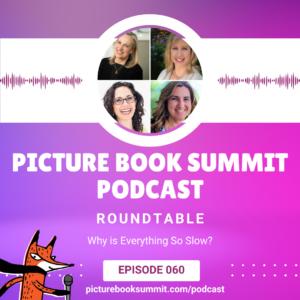 The Picture Book Summit Podcast is BACK! We kick off our newest podcast with a new PBSummit Roundtable episode. Our Roundtable discussions are where our PBSummit team sits down and talks about the topics affecting picture book creators today.
The Picture Book Summit Podcast is BACK! We kick off our newest podcast with a new PBSummit Roundtable episode. Our Roundtable discussions are where our PBSummit team sits down and talks about the topics affecting picture book creators today.
In this episode, we ask the question: Why is Everything So Slow? The pandemic is (basically) over, so why are things not back to normal? Will things ever go back to the way they were or is this slowness the new normal in publishing?
Emma Walton Hamilton leads our discussions. She reached out to her agent and two of her editors for their insights on trend in children’s publishing. We hope you find this discussion fascinating and maybe a little uplifting. Ultimately, there’s some good news related to this pace.
Listen here: